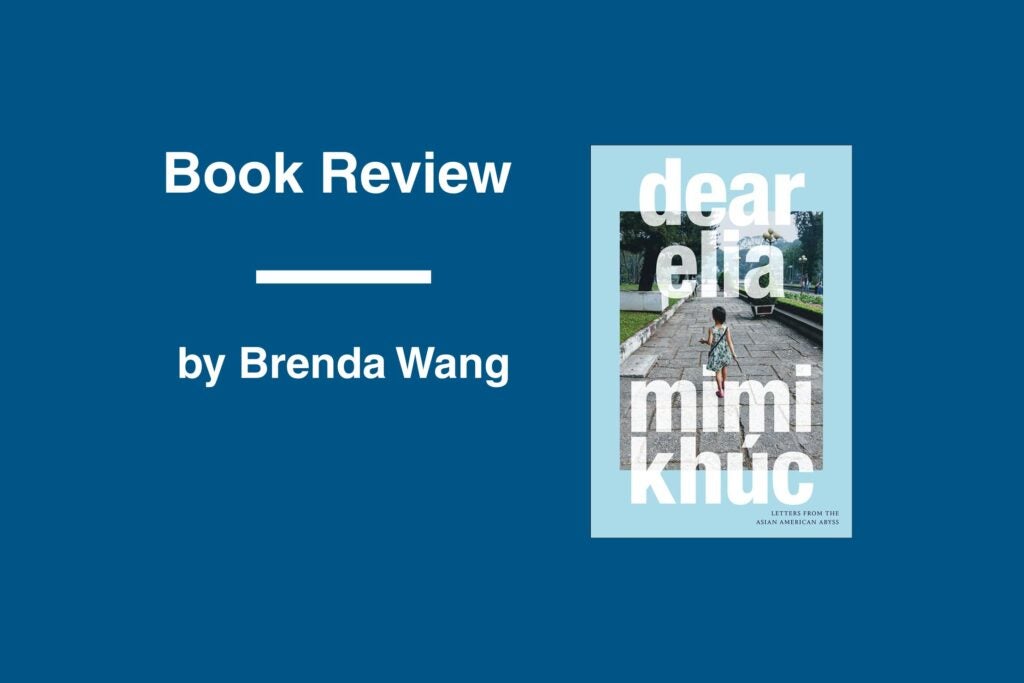A Review of dear elia: Letters from the Asian American Abyss
By Brenda Wang
Dear fellow teacher,
I am writing this to you after a revelatory few hours reading Mimi Khúc’s genre-defying dear elia: Letters from the Asian American Abyss (Duke University, 2024). I join other reviewers, including Anna Nguyen, Autumn Reyes, Sidra Naveed Arshad, Caro Suringar, Lena Chen, Cynthia Wu, and Seo-Young Chu, in urging you to read this remarkable book immediately and then to lend someone else your copy, which will probably be dog-eared and scribbled-in like mine.
dear elia reads with particular urgency given the defunding of higher education by those who seek to placate a fascist regime. Class sizes swell as budgets shrink, and teachers — especially those of us who are precariously or contingently employed — are asked to do more than ever. Thankfully, Khúc refuses to proffer solutions, which usually, in our line of business, involve lessons in self-discipline and hyperproductivity. Instead, she focuses on the structural conditions that produce differential unwellness — that is, unwellness along axes of race, gender, ability, etc. — in the academy. Remaking the classroom outside of the ableist fable of meritocracy requires disturbing deeply-held assumptions about who deserves what and why.
The book consists of a series of letters, beginning with one addressed to her daughter and ending with two blank, lined pages for the reader to write letters to their own past, present, and future selves. Khúc uses the epistolary mode not merely as a formal flourish but to hold together her call for implementing a pedagogy of unwellness in the university, as well as in our own lives. Across these pages, pedagogy emerges as a form of care and claiming of responsibility that threads together different kinds of relationships: between a mother and a daughter, between a dean and an adjunct, between a past self and one that does not yet exist, between, of course, a teacher and her students.
The letters’ interpellatory address finds us in the realities of our “differentially unwell” bodies. As teachers, we spend a lot of time thinking about how to design our courses to be more accessible. Far more rarely do we acknowledge our own needs: that we, too, are not inexhaustible wells of care and productivity, that we cannot be expected to endlessly innovate and improve our teaching. Khúc’s frank admission that she “cuts corners” in her courses, forgets to respond to student emails, and cancels class several times a semester helped me unknot the tight ball of guilt and shame over not being a “good enough” teacher that I’ve been harboring since the beginning of graduate school — or maybe earlier. (Another deeply affirming statement from Khúc: that the “advice to ‘write every day’ is ableist [expletive].”) How might our pedagogical practices change for the better when we embrace, as Khúc does, being “lazy as [expletive]”?
We might begin by challenging ideas we hold about obligation, pedagogical and otherwise. Drawing from erin Khuê Ninh’s theorization of ingratitude as necessary to Asian American flourishing, Khúc asks her readers to “nurture a commitment to injury,” to acts of repeated disobedience, as a way to challenge familiar power relations. As she notes, our understandings of the student-teacher relationship are often interpreted through two much more familiar organizational structures — the cisgender, heteronormative family and the corporate workplace. One of the most helpful components of dear elia are the sections where Khúc annotates her own teaching materials. For example, a syllabus from Spring 2020 instructs students to “treat class like a workplace: You are of course allowed sick days to be used at your discretion…but you must handle them responsibly,” which present-day Khúc annotates with a “What the [expletive] is this??? Class is a workplace?!” As she notes, such an approach in an attendance policy situates illness as a problem of “individual responsibility” instead of a question of collective care. Disconnecting attendance policies from corporatized ideas of productivity, Khúc argues, becomes foundational to creating an enabling classroom community.
dear elia also speaks directly to Asian American scholars, asking us to reflect on how our ideas of the “good student” have been influenced by the concept of the model minority. The book draws parallels between the existential debt many Asian Americans feel like we owe our kin and the expectations to which we hold our students. Familiar anxieties over whether students are “taking advantage” of us or disrespecting our labor, filtered through this lens, begin to resemble patterns of shame, inflexibility, and authority-pleasing that characterize model minority discourses. Releasing ourselves from these obligations frees us to experiment with alternate forms of relation in our pedagogy. Whether you end up reading Khúc’s book or not, I recommend at least responding to the following prompt, which she assigns as a form of self-care:
“Write down all the things you think you owe and to whom. Reflect on what it would mean if you could wave a wand and have all that debt suddenly repaid — what would that feel like? How would your life look and feel differently?”
To release this debt does not mean abnegating one’s responsibility to others; rather, it is a means of choosing, freely, to care for ourselves, one another, and our students.
Brenda Wang is a Ph.D. candidate in the English department at UCLA. An interdisciplinary scholar, her dissertation explores beauty as an embodied cultural project by which questions of desire, gender, and racial belonging are adjudicated. Her work has been published or is forthcoming in ASAP/Journal and Women: A Cultural Review. She is a Cota-Robles Fellow, and her research has been supported by the University of California Office of the President (UCOP) Dissertation Year Award.
